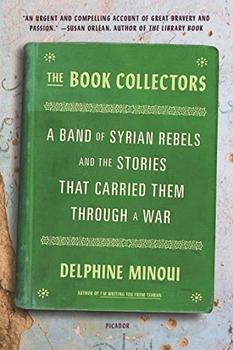Summary | Excerpt | Reading Guide | Reviews | Read-Alikes | Genres & Themes | Author Bio

Nafisi’s luminous tale offers a fascinating portrait of the Iran-Iraq war viewed from Tehran and gives us a rare glimpse, from the inside, of women’s lives in revolutionary Iran.
We all have dreams—things we fantasize about doing and generally never get around to. This is the story of Azar Nafisi’s dream and of the nightmare that made it come true.
For two years before she left Iran in 1997, Nafisi gathered seven young women at her house every Thursday morning to read and discuss forbidden works of Western literature. They were all former students whom she had taught at university. Some came from conservative and religious families, others were progressive and secular; several had spent time in jail. They were shy and uncomfortable at first, unaccustomed to being asked to speak their minds, but soon they began to open up and to speak more freely, not only about the novels they were reading but also about themselves, their dreams and disappointments. Their stories intertwined with those they were reading—Pride and Prejudice, Washington Square, Daisy Miller and Lolita—their Lolita, as they imagined her in Tehran.
Nafisi’s account flashes back to the early days of the revolution, when she first started teaching at the University of Tehran amid the swirl of protests and demonstrations. In those frenetic days, the students took control of the university, expelled faculty members and purged the curriculum. When a radical Islamist in Nafisi’s class questioned her decision to teach The Great Gatsby, which he saw as an immoral work that preached falsehoods of "the Great Satan," she decided to let him put Gatsby on trial and stood as the sole witness for the defense.
Azar Nafisi’s luminous tale offers a fascinating portrait of the Iran-Iraq war viewed from Tehran and gives us a rare glimpse, from the inside, of women’s lives in revolutionary Iran. It is a work of great passion and poetic beauty, written with a startlingly original voice.
Chapter 1
In the fall of 1995, after resigning from my last academic post, I decided to indulge myself and fulfill a dream. I chose seven of my best and most committed students and invited them to come to my home every Thursday morning to discuss literature. They were all women--to teach a mixed class in the privacy of my home was too risky, even if we were discussing harmless works of fiction. One persistent male student, although barred from our class, insisted on his rights. So he, Nima, read the assigned material, and on special days he would come to my house to talk about the books we were reading.
I often teasingly reminded my students of Muriel Spark's The Prime of Miss Jean Brodie and asked, Which one of you will finally betray me? For I am a pessimist by nature and I was sure at least one would turn against me. Nassrin once responded mischievously, You yourself told us that in the final analysis we are our own betrayers, playing Judas to our own Christ. Manna pointed out...
 Bernard Lewis, author of What Went Wrong?
A memoir about teaching Western literature in revolutionary Iran, with profound and fascinating insights into both. A masterpiece.
Bernard Lewis, author of What Went Wrong?
A memoir about teaching Western literature in revolutionary Iran, with profound and fascinating insights into both. A masterpiece. Geraldine Brooks, author of Nine Parts of Desire
It is at once a celebration of the power of the novel and a cry of outrage at the reality in which these women are trapped. The ayatollahs don’t know it, but Nafisi is one of the heroes of the Islamic Republic.
Geraldine Brooks, author of Nine Parts of Desire
It is at once a celebration of the power of the novel and a cry of outrage at the reality in which these women are trapped. The ayatollahs don’t know it, but Nafisi is one of the heroes of the Islamic Republic. Jacki Lyden, National Public Radio, author of Daughter of the Queen of Sheba
... mesmerizingly, she reveals the shimmering worlds she created in those classrooms, inside a revolution that was an apogee of kitsch and cruelty. You will be taken inside a culture, and on a journey, that you will never forget.
Jacki Lyden, National Public Radio, author of Daughter of the Queen of Sheba
... mesmerizingly, she reveals the shimmering worlds she created in those classrooms, inside a revolution that was an apogee of kitsch and cruelty. You will be taken inside a culture, and on a journey, that you will never forget. Susan Sontag
Her memoir contains important and properly complex reflections about the ravages of theocracy, about thoughtfulness, and about the ordeals of freedom.
Susan Sontag
Her memoir contains important and properly complex reflections about the ravages of theocracy, about thoughtfulness, and about the ordeals of freedom.
If you liked Reading Lolita In Tehran, try these:

by Delphine Minoui
Published 2021
Award-winning journalist Delphine Minoui recounts the true story of a band of young rebels, a besieged Syrian town, and an underground library built from the rubble of war.

by Louise Callaghan
Published 2021
Father of Lions is the powerful true story of the evacuation of the Mosul Zoo, featuring Abu Laith the zookeeper, Simba the lion cub, Lula the bear, and countless others, faithfully depicted by acclaimed, award-winning journalist Louise Callaghan in her trade publishing debut.




The moment we persuade a child, any child, to cross that threshold into a library, we've changed their lives ...
Click Here to find out who said this, as well as discovering other famous literary quotes!